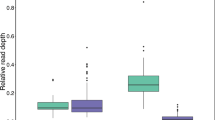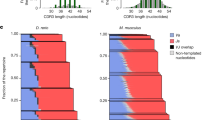Abstract
Colonial tunicates, unlike vertebrates, undergo transplantation in nature. Rejection or acceptance between colonies of Botryllus is controlled by a single gene locus with multiple alleles. The same genetic region apparently maintains this polymorphism by preventing fertilization between gametes sharing alleles. The Botryllus histocompatibility system may reflect the original adaptive function of ancestral MHC genes.
This is a preview of subscription content, access via your institution
Access options
Subscribe to this journal
Receive 51 print issues and online access
$199.00 per year
only $3.90 per issue
Buy this article
- Purchase on Springer Link
- Instant access to full article PDF
Prices may be subject to local taxes which are calculated during checkout
Similar content being viewed by others
References
Medawar, P. B. J. Anat. 78, 176–199 (1944).
Snell, G. D. Folia biol., Praha 14, 335–358 (1968).
Gorer, P. A. J. Path. Bact. 47, 231–252 (1938).
Klein, J. Biology of the Mouse Histocompatibility–2 Complex (Springer, New York, 1975).
Hildemann, W. H., Clark, E. A. & Raison, R. L. Comprehensive Immunogenetics (Elsevier, New York, 1981).
Hildemann, W. H. Transplantation 27, 1–3 (1979).
Scofield, V. L. & Weissman, I. L. Devl comp. Immun. 5, 23–28 (1981).
Bancroft, R. W. Proc. Calif. Acad. Sci. 3, 137–187 (1903).
Oka, H. & Watanabe, H. Proc. Japan Acad. 33, 657–659 (1957).
Sabbadin, A. Rc. Accad. naz. XL 32, 1031–1035 (1962).
Sabbadin, A. in Marine Organisms: Genetics, Ecology, and Evolution (eds Battaglia, B. & Beardmore, B. A.) 195–209 (Plenum, New York, 1979).
Milkman, R. Biol. Bull. 132, 229 (1967).
Tanaka, K. & Watanabe, H. Cell. Immun. 7, 410–426 (1973).
Tanaka, K. Cell. Immun. 7, 427–443 (1973).
Sabbadin, A. Devl Biol. 24, 379–391 (1971).
Burnet, F. M. Nature 230, 232–235 (1971).
Heslop-Harrison, J. Cellular Recognition Systems in Plants (Arnold, London, 1978).
Bennett, D., Boyse, E. A. & Old, L. J. in 3rd Lepetit Colloq. 247263 (North Holland, Amsterdam, 1972).
Monroy, A. & Rosati, F. Nature 27, 165–166 (1979).
Hedrick, P., Jain, S. & Holden, L. in Evolutionary Biology Vol. 11 (eds Hecht, M. K., Steere, W. C. & Wallace, B.) 104–184 (Plenum, New York, 1978).
Hammerberg, C. & Klein, J. Nature 258, 296–299 (1975).
Lyon, M. F., Evans, E. P., Karvos, S. E. & Sayer, I. Nature 279, 38–42 (1979).
Sabbadin, A. Cited in Scofield, V. L. & Weissman, I. L. Devl comp. Immun. 5, 23–28 (1981).
Bennett, D. Cell 6, 441–454 (1975).
Author information
Authors and Affiliations
Rights and permissions
About this article
Cite this article
Scofield, V., Schlumpberger, J., West, L. et al. Protochordate allorecognition is controlled by a MHC-like gene system. Nature 295, 499–502 (1982). https://doi.org/10.1038/295499a0
Received:
Accepted:
Issue Date:
DOI: https://doi.org/10.1038/295499a0
This article is cited by
-
Immunoglobulin-like receptors and the generation of innate immune memory
Immunogenetics (2022)
-
Multiple Alr genes exhibit allorecognition-associated variation in the colonial cnidarian Hydractinia
Immunogenetics (2022)
-
Gamete-level immunogenetic incompatibility in humans–towards deeper understanding of fertilization and infertility?
Heredity (2020)
-
Cell Communication-mediated Nonself-Recognition and -Intolerance in Representative Species of the Animal Kingdom
Journal of Molecular Evolution (2020)
-
Complex mammalian-like haematopoietic system found in a colonial chordate
Nature (2018)
Comments
By submitting a comment you agree to abide by our Terms and Community Guidelines. If you find something abusive or that does not comply with our terms or guidelines please flag it as inappropriate.



